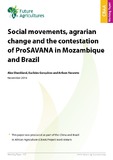| dc.contributor.author | Shankland, Alex | |
| dc.contributor.author | Gonçalves, Euclides | |
| dc.contributor.author | Favareto, Arilson | |
| dc.coverage.spatial | Brazil | en |
| dc.coverage.spatial | Mozambique | en |
| dc.date.accessioned | 2016-12-07T09:29:16Z | |
| dc.date.available | 2016-12-07T09:29:16Z | |
| dc.date.issued | 2016-11 | |
| dc.identifier.citation | Shankland, A.,Gonçalves, E. & Favareto, A. (2016). Research Social movements, agrarian change and the contestation of ProSAVANA in Mozambique and Brazil, Future Agricultures Working Paper 137, Brighton: Future Agricultures Consortium. | en |
| dc.identifier.uri | https://opendocs.ids.ac.uk/opendocs/handle/20.500.12413/12687 | |
| dc.description.abstract | ProSAVANA, the Mozambique-Brazil-Japan Cooperation Programme for the Agricultural Development of the Savannah of Mozambique, is the most visible of Brazil’s international agricultural cooperation projects. In the period since its launch in 2010 it has become a magnet for internationally-minded Brazilian agribusiness interests and a rallying-point for their domestic opponents. It was initially framed as the centrepiece of the Mozambican government’s proclaimed strategy to promote an agrarian transformation of the ‘Nacala Corridor’ region, which includes some of the country’s poorest, most populous and most politically contested rural areas. It has now become a key focus for contention between government and civil society in Mozambique, as well as a source of tensions between different parts of Mozambican civil society. The contestation process has led to major changes in the programme’s focus and approach, and consultation is now under way on a ‘Master Plan’ for the Nacala Corridor that has little in common with the version initially outlined by the promoters of Brazilian agribusiness expansion to the region. At the same time, Brazil’s engagement with ProSAVANA has been transformed by major changes in the country’s own political and economic context. This paper traces the pathways that plans for ProSAVANA and transnational mobilisationsagainst the programme have followed over the course of the half-decade since work on the ‘Master Plan’ began. It examines how different visions of agricultural development and different practices of social mobilization have interacted within Brazil and Mozambique and travelled between the two countries, with the aim of drawing lessons for future studies of the South-South Cooperation initiatives that are increasingly connecting BRICS and other rising powers with African countries. | en |
| dc.description.sponsorship | UK Government | en |
| dc.language.iso | en | en |
| dc.publisher | Future Agricultures Consortium | en |
| dc.relation.ispartofseries | Future Agricultures Consortium Working Paper;137 | |
| dc.relation.ispartofseries | China and Brazil in African Agriculture Working Paper Series; | |
| dc.rights | Readers are encouraged to quote or reproduce material from Future Agricultures Briefings in their own publications. In return, the Future Agricultures Consortium requests due acknowledgement and a copy of the publication. | en |
| dc.rights.uri | http://www.ids.ac.uk/files/dmfile/IDSOpenDocsStandardTermsOfUse.pdf | en |
| dc.rights.uri | http://creativecommons.org/licenses/by/4.0/ | |
| dc.subject | Agriculture | en |
| dc.subject | Development Policy | en |
| dc.subject | Economic Development | en |
| dc.subject | Politics and Power | en |
| dc.subject | Social Protection | en |
| dc.subject | Trade | en |
| dc.title | Social movements, agrarian change and the contestation of ProSAVANA in Mozambique and Brazil | en |
| dc.type | Series paper (non-IDS) | en |
| dc.rights.holder | Future Agricultures Consortium | en |
| dc.identifier.externaluri | http://www.future-agricultures.org/research/cbaa/8031-china-brazil-paper-series | en |
| dcterms.dateAccepted | 2016-11 | |
| rioxxterms.funder | Economic and Social Research Council | en |
| rioxxterms.identifier.project | Rising Powers and Interdependent Futures | en |
| rioxxterms.version | VoR | en |
| rioxxterms.funder.project | e0161d56-20c6-4cbc-b00d-afa5835bb9ae | en |

